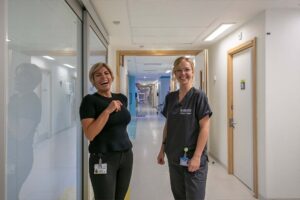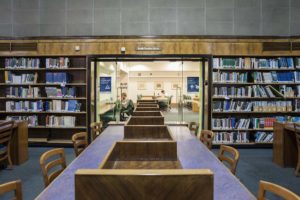How you'll learn
The School uses an integrated teaching model. The learning of medical sciences is enhanced by the clinical context of a systems-based approach. The development of understanding of clinical practice is supported by a ‘just in time’ model of academic weeks that relate to each clinical placement and case-based teaching within each placement. Specialist clinical centres from across the region provide students with a wide range of exceptional placement experiences during which students complete structured learning activities as well as taking advantage of near patient learning opportunities.
The School is at the forefront of technology enhanced learning, utilising mobile learning, virtual reality, simulation and a personalised e-portfolio to provide our students with the best possible experience and prepare them for the technological developments that will shape their future careers in healthcare.
We take the development of clinical leaders seriously and use a programme of experiential learning opportunities to develop students’ leadership and followership skills in a range of situational contexts.
The remainder of the course is delivered using a mix of interactive and didactic lecturing; case based learning, small group teaching, clinical skills and simulation workshops, Human Anatomy Resource Centre (HARC) sessions, communication skills practicals and a staged programme of research skills development.
The breadth of learning and teaching activities used within the Medical School ensures students have the underpinning knowledge and skills to become the safe clinical practitioners of tomorrow.
How you're assessed
Both formative and summative assessment take place within the programme. There is an emphasis on assessment for learning through the use of subject specific tests such as quizzes, anatomy spotters and formative Objective Structured Clinical Examinations (OSCEs).
Summative assessment takes place at the end of each year and includes written papers and practical exams in the form of OSCES and LOCAS.
We use technology to facilitate online marking and annotated feedback of written assignments, deliver formative online tests for students at the end of each teaching block and collate and deliver OSCE data, providing students with more useful feedback as a result.
A bespoke electronic portfolio, integrated throughout the curriculum provides students with a personalised learning space where they can collect evidence and develop their skills through reflective activities. The e-portfolio charts the student learning journey over the course of the programme.
Liverpool Hallmarks
We have a distinctive approach to education, the Liverpool Curriculum Framework, which focuses on research-connected teaching, active learning, and authentic assessment to ensure our students graduate as digitally fluent and confident global citizens.
The Liverpool Curriculum framework sets out our distinctive approach to education. Our teaching staff support our students to develop academic knowledge, skills, and understanding alongside our graduate attributes:
- Digital fluency
- Confidence
- Global citizenship
Our curriculum is characterised by the three Liverpool Hallmarks:
- Research-connected teaching
- Active learning
- Authentic assessment
All this is underpinned by our core value of inclusivity and commitment to providing a curriculum that is accessible to all students.







